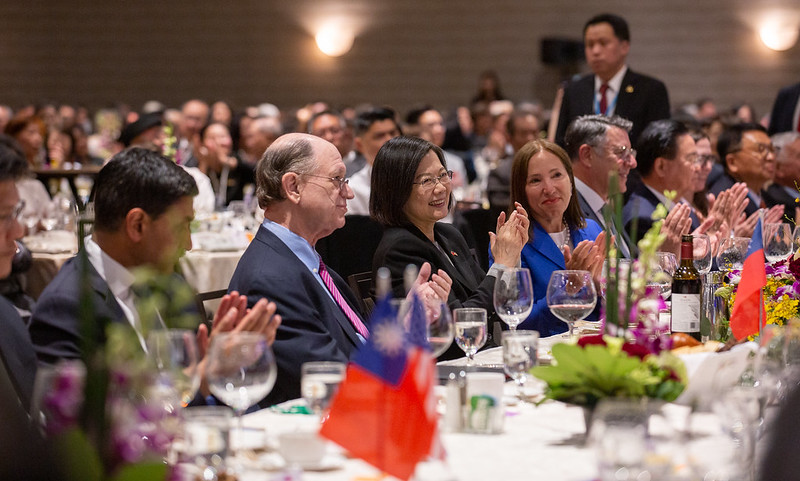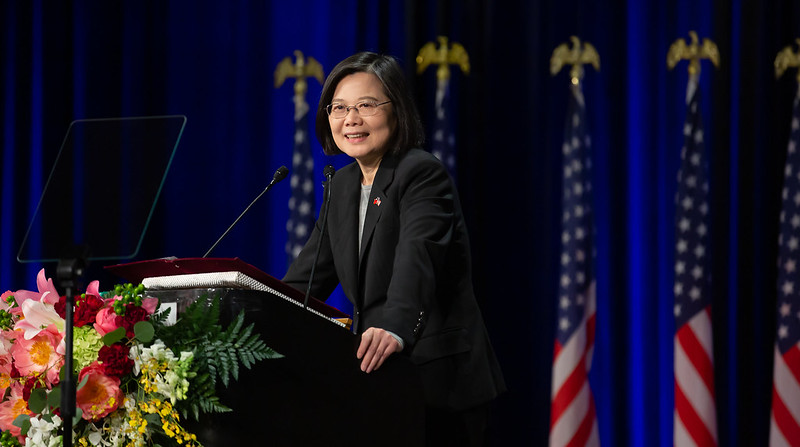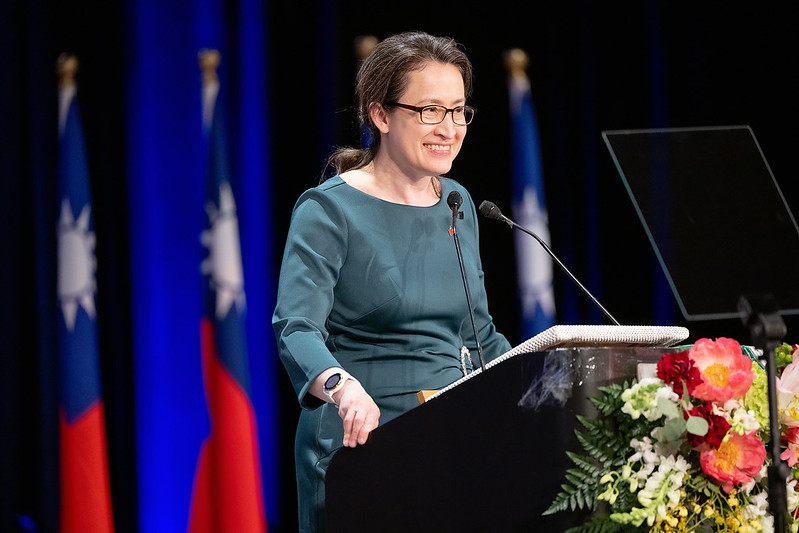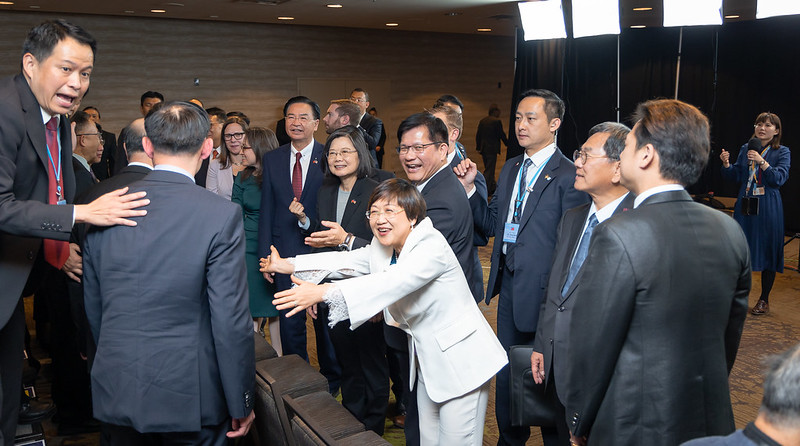News & activities
 News releases
News releases
On the evening of April 5 local time (morning of April 6 Taipei time), President Tsai Ing-wen attended a banquet with the local and Taiwanese expatriate communities in Los Angeles, where she thanked our overseas compatriots for all they have done to let the world see Taiwan as a force for good. She added that our compatriots are an extension of Taiwan's national power, and expressed hope that we can all work together to garner more support for Taiwan worldwide.
In remarks, the president said that she is pleased to transit again through Los Angeles and is touched by the very warm welcome from the Taiwanese American community. She thanked Acting Governor Eleni Kounalakis of California for welcoming her and arranging for them to enjoy the beautiful California sunshine, and she also thanked members of Congress for joining her and her delegation at the event, adding that she is grateful for their hospitality and for their friendship toward the people of Taiwan.
That morning, the president said, she was honored to meet with a bipartisan delegation of Congressional leaders convened by Speaker Kevin McCarthy of the United States House of Representatives at the Ronald Reagan Presidential Library, where they had a very productive discussion on matters pertaining to our shared values and common interests, including peace and stability in the Indo-Pacific, prosperity for our societies, and safeguarding freedom and democracy.
President Tsai shared with the attendees that the people of Taiwan are resilient and are determined to defend and preserve our way of life and to deepen our longstanding partnership with the US. She said that she was gratified by the unity of support from the speaker and congressional leaders from both sides of the political aisle, noting how their standing with Taiwan in this turbulent geopolitical environment demonstrates that the Taiwanese people are not alone.
The president expressed her belief that the many guests in attendance at the event are testament to the fact that Taiwan, as a force for good in the world, will never be alone, and pointed out that the Taiwanese American community, through its generosity and activism, has helped Taiwan build many friendships around the world, including with the special guests at the event.
President Tsai said that she is happy to see so many members of the Taiwanese community in Los Angeles, noting that this, her first overseas trip in three years, is primarily to visit Belize and Guatemala, with transit stops in New York City and Los Angeles on the outward and return legs of her trip. She acknowledged that many of those from the Taiwanese community in attendance are from the Los Angeles area but also that many had traveled there from other places. For over three years, the president said, the COVID-19 pandemic has enveloped the entire world; many people were unable to return to Taiwan, and there were many restrictions on individual movement throughout the world. Fortunately, she said, many people from the Taiwanese community from a wide range of fields helped Taiwan and raised its global awareness.
Although Taiwan and the US are on opposite sides of the Pacific Ocean, President Tsai noted, we are all working together. She pointed out how, when Taiwan donated face masks to countries around the world, members of the Taiwanese community in the US pitched in by donating disease prevention supplies, and when Taiwan sought to participate in the World Health Assembly, they spoke up for Taiwan. She added that when Taiwan provided aid to Ukraine and disaster relief to Türkiye, many people donated supplies to the disaster areas in an act of unity and compassion. That is just how Taiwanese are, she said – no matter where we are, we come together and give of ourselves, letting the world see Taiwan as a force for good. So now, she said, when someone in the US says "I am Taiwanese," there is a sense of pride and a show of approval.
President Tsai said that over the past few years Taiwan has proven one thing: because we are unified, we can weather any storm. Taiwan is always improving, she added, and although the pandemic has been a challenge for the global economy, businesses at home and abroad remain bullish on Taiwan. The president then pointed out how, over the past few years, over NT$2 trillion has been invested through our Three Major Programs for Investing in Taiwan, and that during that same period, ASML Holding N.V. and Merck have also launched large-scale investment plans in Taiwan.
President Tsai said that Taiwan ranked fourth in the 2023 Index of Economic Freedom recently released by the US-based Heritage Foundation, our best performance ever. She added that this past February, Taiwan ranked third worldwide in the National Entrepreneurship Context Index released by the Global Entrepreneurship Monitor. She further added that also in February, Taiwan ranked first in Asia in the 2022 Democracy Index published by the Economist Intelligence Unit, and said that these achievements are a tribute to the efforts of all Taiwan's citizens, whether in Taiwan or abroad.
President Tsai said that Taiwan is making consistent progress and continues to engage with the world, and, as she has said before, our fellow compatriots are an extension of Taiwan's national power. She explained how over the past few days in Guatemala and Belize she saw overseas Taiwanese hard at work like everyone present today, as well as our diplomatic personnel, technical missions, and young people doing alternative national service giving their all on the frontline to show how Taiwan can help.
As an example, the president cited the hospital she visited in Guatemala, a facility the local populace had been anticipating for some time, which was completed through cooperation between Taiwan and Guatemala in just 18 months. She also cited examples in Belize, saying that she gained an up-close understanding of what the Taiwan technical mission's sheep and goat breeding project has achieved, and that she witnessed how the women's empowerment project has helped Belizean women find employment and start businesses over the past few years.
President Tsai also mentioned that on this trip, we signed cooperative agreements with Guatemala and Belize, and that we will continue to deepen bilateral exchanges. She added that we will continue our efforts to broaden Taiwan's international space, and that Taiwan will continue to make improvements so that when people in the US talk about Taiwan, it will be with an even greater sense of honor and pride.
President Tsai thanked everyone once again, saying that because of their diligence and contributions while living abroad, Taiwan has over the past few years received increasingly stronger support from the US government, Congress, and public, and Taiwan-US relations have grown both deeper and closer.
President Tsai thanked Taiwan's many American friends for valuing and supporting Taiwan, noting the completion just this past January of a second negotiating round under the Taiwan-US Initiative on 21st-Century Trade and that our goal is to complete talks on this trade initiative before the end of this year. Also, she said, Taiwan and the US will continue to engage in successive rounds of the Economic Prosperity Partnership Dialogue to further enhance our partnership. She affirmed that our goal is to enter into a free trade agreement with the United States, and these negotiations and discussions are being made in preparation.
The president emphasized that in the face of expanding authoritarianism, we must hold fast to the values of democracy and freedom, for these are our way of life. She added that Taiwan will continue working with the US and all our democratic partners to defend our values and maintain regional peace and stability.
The president stated that we will face many more challenges ahead, just as those in the audience themselves faced and overcame many challenges in the US on their way to success. The president told the audience that no matter how many or how serious these challenges are, Taiwan will not be cowed but will find our way forward. She expressed her firm belief that a more united, more secure and stronger Taiwan is conducive to global stability, and that we will need to work together to become a force that can stabilize Taiwan and the world.
The president again thanked everyone for all they have done for Taiwan, saying that we are all members of Team Taiwan, and we hope to garner more support for Taiwan worldwide. She concluded her remarks by appealing to everyone to walk together on the path of democracy and freedom, to engage with the world, and to do our utmost for Taiwan.
Representative to the US Bi-khim Hsiao (蕭美琴) also delivered remarks, saying that as Taiwanese people, we all hope for more friends and more support for Taiwan in the international community. She said that despite the difficult circumstances, Taiwan has grown stronger and more stable over the course of decades, whether in its efforts to become more democratic or in overcoming its many challenges, demonstrating the resilience of the Taiwanese people. Noting how we have seen the president make her own sacrifices as she led the people forward without ever bowing to pressure, Representative Hsiao pointed to those actions as indicative of Taiwanese resiliency.
Seeing President Tsai welcomed on her US transit by Speaker McCarthy that morning at a bipartisan meeting at the Ronald Reagan Presidential Library, where the president and speaker exchanged views on Taiwan-US relations in areas such as security, economic prosperity, culture, and educational cooperation, Representative Hsiao noted how she was deeply moved. It is rare, she said, for elected representatives from across party lines in US Congress to stand together and take a united position on an issue – in this instance, their shared support and concern for Taiwan, and said she believes this is a result of the long-term efforts by Taiwanese at home and abroad. Nothing that the world has recognized our economic, scientific, technological, and democratic successes, Representative Hsiao expressed her deepest gratitude to our overseas compatriots for everything they have done for Taiwan's democracy and our diplomatic efforts.
Among those in attendance at the event were American Institute in Taiwan Chairperson Laura Rosenberger, US Representatives Brad Sherman, Darrell Issa, Judy Chu (趙美心), Ro Khanna, and Michelle Steel, as well as California State Assemblyman Tri Ta.












